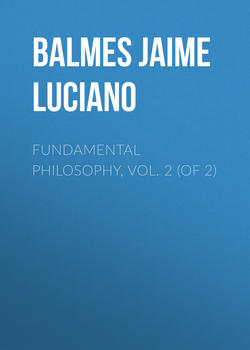Читать книгу Fundamental Philosophy, Vol. 2 (of 2) - Balmes Jaime Luciano - Страница 12
BOOK FOURTH.
ON IDEAS
CHAPTER XII.
THE SENSISM OF KANT
Оглавление80. Kant maintained that while in the present life, we have only sensible intuition; and he considers the possibility of a purely intellectual intuition, whether for our own or for other minds doubtful. But as we have seen elsewhere (ch. IX.) that he does not attribute any value to conceptions separated from intuition, we infer that he is, notwithstanding his long dissertations upon the pure understanding, a confirmed sensist; and that the authors of the Critic of Pure Reason, and of the Treatise on Sensations, differ much less than at first sight might be supposed. If our mind has no other intuition than the sensible, and the conceptions of the pure understanding are, if they do not include some one of these intuitions, nothing but empty forms; if when we abstract these intuitions, there are in the understanding only purely logical functions, which mean nothing, and in no sense deserve to be called cognitions; it follows that there is in our mind nothing but sensations, which may be methodically distributed in conceptions, as if packed away in a kind of hut, where they are registered and preserved. According to this philosopher, the understanding is reduced so low, that Condillac himself might admit it.
81. Indeed, in the system of sensations transformed, the mind is supposed to possess a transforming force, since otherwise, it would be impossible to explain all ideological phenomena by mere sensation, and the very title of the system would be a contradiction. This being so, would any sensistic scruple have prevented Condillac from admitting the synthesis of the imagination, the relations of all sensible intuitions to the unity of apperception, and finally, a variety of logical functions, to classify and compare sensible intuitions? So far is this from being the case, it would seem that the root of all these doctrines might be found in the system of the French philosopher, whose fundamental principles, when summed up, amount to this: that nothing can be seen in the mind besides sensations; but he does not therefore deny it a force capable of transforming, classifying, and generalizing them.
82. Here, then, is another check to the originality of the German philosopher; he has, to combat sensism, said in substance just what, ages before, all the schools repeated; and now when he undertakes to follow a new road to the explanation of the purely intellectual order, he falls into Condillac's system. His empty conceptions, without meaning, without application, beyond the sensible order, amount to no more than what Condillac taught when analyzing the generation of ideas, and showing how they flowed from sensations by means of successive transformations. Could there be any difficulty, it would be concerning words, not things: no sensist ought to hesitate accepting whole and entire the Critic of Pure Reason, when once he has seen what applications the German spiritualist makes of his doctrines. It would be very desirable for those who insist that the spiritualism of Kant is decidedly destructive of Condillac's sensism, to weigh well these observations.
